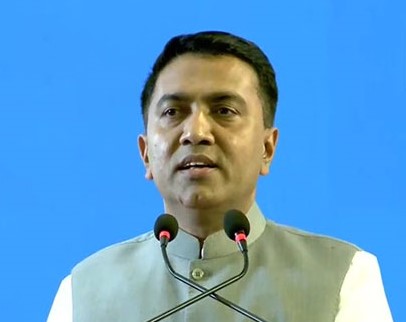Goa celebrates its 63rd Liberation Day on Thursday, marking the state’s independence from Portuguese rule in 1961 after 451 years of colonial occupation.
President Droupadi Murmu, in a post on X, honored the freedom fighters and armed forces who played pivotal roles in Goa’s liberation.
“On Goa Liberation Day, the nation pays tribute to brave-hearts who made selfless sacrifices for Goa’s liberation. We salute the fearless freedom fighters and our armed forces for their courage and dedication. I extend warm wishes to the people of Goa and wish them a prosperous future,” President Murmu said.
Honouring the Martyrs and Their Families
On Wednesday, Chief Minister Pramod Sawant led a ceremony to honour the families of the freedom fighters who contributed to Goa’s liberation.
During his address, Sawant emphasized the importance of remembering the sacrifices made to end Portuguese rule, expressing deep gratitude to those who fought for Goa’s freedom. He underscored the harshness of Portuguese colonialism, which spanned nearly 450 years.
The Legacy of ‘Operation Vijay’
Goa’s liberation was achieved through ‘Operation Vijay,’ a military campaign launched by the Indian Armed Forces in December 1961.
The 36-hour operation ended Portuguese control, resulting in Goa’s integration into the Indian Union. The liberation of Goa marks a major moment in India’s post-independence history, as it was the last territory in India to be freed from foreign colonial rule.
Historical Significance of Goa’s Freedom Movement
Goa’s struggle for freedom was deeply intertwined with India’s broader independence movement. While India gained independence in 1947, Goa remained under Portuguese rule until 1961. Inspired by the national movement, many Goans, including women, joined the protests to demand an end to colonial rule.
One of the most prominent freedom fighters was Mohan Ranade, who led armed revolts against the Portuguese and was imprisoned in 1955. Ranade spent 14 years in prison, six of them in solitary confinement, before being released in 1969. For his contributions to Goa’s freedom struggle, he was later awarded the Padma Shri in 2001.
Reflecting on Goa’s Unique Identity
Goa’s cultural and religious identity, shaped by centuries of Portuguese influence, remains a distinctive part of the state’s heritage. The liberation in 1961 allowed Goa to reclaim its place within the Indian Union, and today, the state stands as a vibrant symbol of a successful struggle for freedom.
Chief Minister Sawant, reflecting on this historic day, noted that Goa’s Liberation Day is not just a celebration of freedom but also a reminder of the state’s rich cultural past and enduring spirit.
“Goa’s liberation is a testament to the bravery and resilience of its people,” he said, highlighting the unique history and culture that continue to define Goa’s identity today.




















